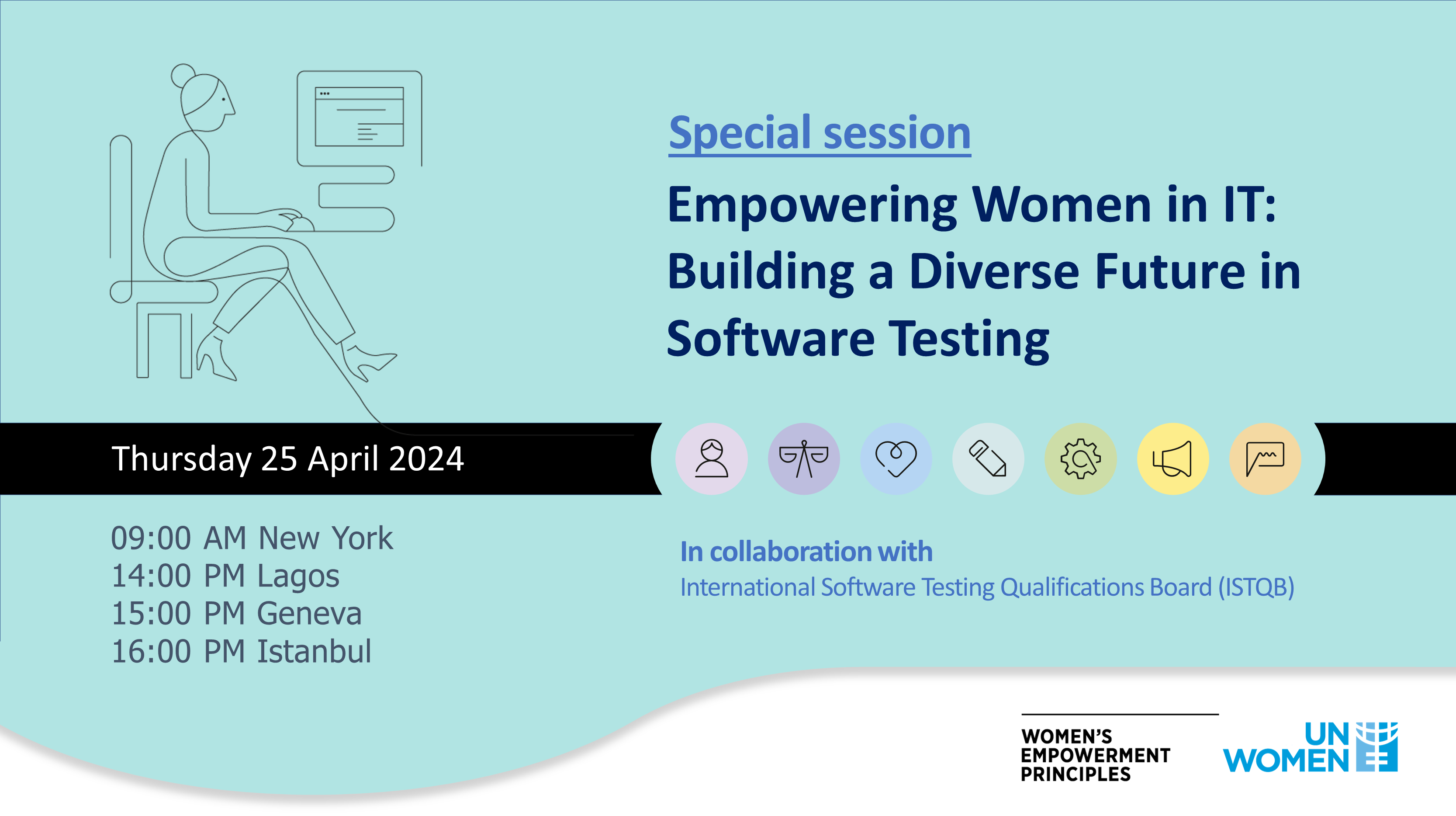Did you know that 25 April 2024 was the International Girls in ICT Day? To celebrate this day and to inspire and encourage girls and women to pursue a future in ICT jobs, the WEPs Global Secretariat joined forces with the International Software Testing Qualifications Board (ISTQB) to host a special session on the career path in software testing. The event aligned with this year's theme, Leadership, underscoring the urgent need for robust female role models in STEM careers.
The webinar brought together a panel of inspiring women from ISTQB based in different parts of the world to discuss their journeys in the field of software testing. This discussion aimed to motivate more women to join and thrive in ICT sectors, particularly in software testing.
Current situation of the women in ICT
Anna Falth, Global Head of the WEPs secretariat, highlighted that despite women holding 40% of high-skill occupations globally, their representation in ICT-related fields remains dismally low. Women are conspicuously absent from software development, engineering, technology research, academia, and high-level strategic roles. They tend to exit STEM jobs at higher rates than men, a trend that calls for immediate attention and action.
Understanding Software Testing
Software testing ensures that a software product meets its requirements and works as intended. This process involves various stages, from initial unit tests to final acceptance tests that evaluate functionality, usability, performance and more. It is a multidisciplinary field, incorporating insights from engineering, user experience, and beyond.
The ISTQB, established in 2002, has been a cornerstone for quality assurance in software testing. ISTQB has also launched the "Women in Testing" initiative to boost women’s participation in this sector, featuring interviews and panel discussions with female role models.
Stories from women leaders in software testing
The WEPs team invited three speakers from ISTQB: Klaudia Dussa-Zieger, President of ISTQB, Millicent Orera, Marketing Director from ISTQB Kenya, and Reifa Tangon, Vice president of ISTQB Indonesia. The speakers shared their paths into software testing and advice for women who are interested in pursuing a career in this field.
Q1: How did you choose this career and what is your day-to-day job like?
Klaudia's entry into software testing was initially driven by practical needs; the proximity of her workplace allowed her to balance her career with family responsibilities. Her career evolved from manual testing to test automation and management, eventually leading her to the ISTQB. She now manages software programmes and actively engages in outreach to inspire the next generation of women in ICT. Klaudia emphasizes the importance of curiosity in her diverse roles.
Reifa's journey began with international studies in IT and business information management, driven partly by her father's wishes. Upon returning to Indonesia, she founded her own software testing company. Her daily routine involves continuous learning to stay abreast of technological advancements. Reifa highlights the necessity of lifelong learning and curiosity in her work.
Millicent shared her story on career transitioning. Transitioning from the health and development sector, Millicent discovered her passion for software testing while working on a digital health platform. She took a course on software testing and made a career switch. This further strengthened her role in the development sector as she focuses on the role of ICT for development. With only 30% women ICT professionals in Kenya, Millicent values her role in amplifying women's voices in this community.
Q2: What are the biggest challenges you have faced in your career due to unconscious bias and stereotypes?
Noting that only 18% of software testers are women, Klaudia stressed the need for more female representation in leadership roles. Mentorship and coaching are crucial to bringing more women into the field and supporting their advancement.
Reifa spoke about the difficulty of earning respect and trust from clients, often feeling the need to work harder than her male counterparts. She highlighted the importance of thorough understanding and continuous learning to overcome these biases.
Millicent echoed similar sentiments, pointing out the double standards women face. Assertive women are often labeled as bossy, while men are assessed based on their potential. She advocates for more mentorship opportunities to support women's leadership in ICT.
Q3: Are there country-specific barriers for women in ICT in countries where your coming from?
In Kenya, despite a thriving digital economy, women remain underrepresented in ICT. Numerous organizations are working to change this, promoting women's participation in fields like software testing.
Indonesia's geographical challenges create disparities in opportunities. Women from smaller islands face significant barriers to entering ICT. Conscious efforts are needed to bridge this gap and ensure regional representation.
“Cultivate curiosity, as it is essential for success in software testing.” The speakers shared advice to women who are interested in shifting careers to software testing. All of them emphasized the importance of leveraging skills from the current career to transition into software testing as software testing requires diverse pool of talents. Starting from the user experience side could be a good way to start as well. They also emphasized the importance of networking with professionals in software testing.
Finally, the speakers concluded the webinar by inspiring women to continuously peruse their aspirations and be prepared for future opportunities. The ISTQB webinar underscored the significance of leadership and empowerment for women in ICT. By sharing their experiences, the panelists offered valuable insights and encouragement to women aspiring to enter and excel in the field of software testing.

